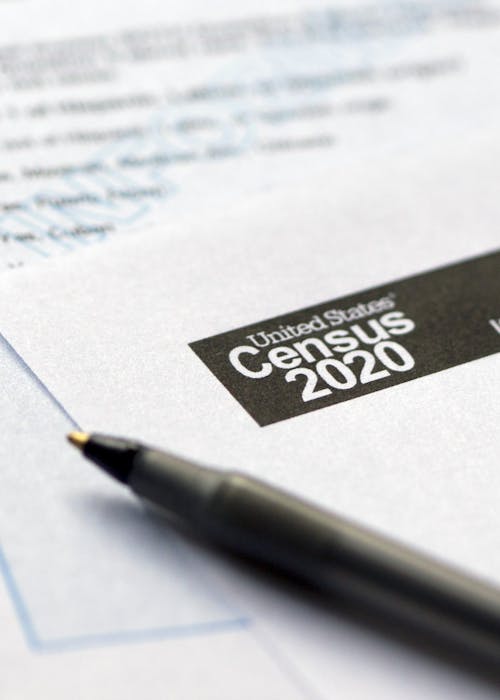

Census 2020: Citizenship question in front of SCOTUS
Insights
April 23, 2019

Today, the Supreme Court of the United States will hear oral arguments on the addition of a question to the 2020 Census form asking respondents’ for their citizenship status.
The fight against the inclusion of the question goes back to 2018 when states and other entities began to file lawsuits against the Commerce Department — the department overseeing the Census Bureau — for attempting to add the citizenship question.
According to the Census Bureau’s own analysis in 2018, the addition of the question would disproportionately impact the response rate from non-citizen households and Hispanic citizen households.
Now, New York is leading a coalition of 16 states, seven cities, and the U.S Conference of Mayors in a challenge to the Commerce Department’s decision to add a citizenship question to the 2020 Census. The plaintiffs argue that it violates the U.S. Constitution and is a racially motivated attempt at suppressing 2020 Census response rates.
Earlier this year, three federal judges in New York, California and Maryland agreed. Now it is up to the Supreme Court whether the question will make it onto the final version of the census form.
What is the impact of the 2020 Census citizenship question?
The Constitution requires a census be conducted every 10 years to count everyone living in the United States without exception. This includes adults and children, citizens and noncitizens.
However, according to Census Bureau’s own analysis in 2018, the addition of the question would disproportionately impact the response rate from non-citizen households and Hispanic citizen households. Thus, the bureau’s decision to include the question is an attempt to suppress the response rate and will negatively impact the census’ accuracy.
Why is the Census so important to New York?
A fair and accurate census is critical to New York, a state with large hard-to-count communities. According to the Fiscal Policy Institute, there are 4.8 million hard-to-count New Yorkers. Hard-to-count populations may face barriers to participation including geographic or linguistic isolation, discomfort with sharing personal information, or distrust of the government.
Household internet access in New York City is far from universal. For example, 42 percent of households on the Lower Eastside have no web access, according to Census data.
Furthermore, 2020 Census could be the first time most people will fill out their census survey online, and most households won’t even receive a paper questionnaire. That means internet accessibility will be key in ensuring all New Yorkers are counted. However, household internet access in New York City is far from universal. For example, 42 percent of households on the Lower Eastside have no web access, according to Census data.
A citizenship question would only further suppress the response rates in already under-resourced communities because Census data is used to steer vital funding to New York.
In 2016 alone, data from the 2010 Census steered $73.3 billion in federal funding to New York State, according to the GW Institute for Public Policy. These funds went to programs all New Yorkers use including Medicaid, public housing and student loans.
Funding from the Census also greatly impacts programs for children. The Council on Children and Families has said the state receives $6.7 billion annually in federal funding for programs targeting children. These include special education grants, children’s health insurance and early childhood programs such as Head Start.
Know the facts, share the facts, be part of the solution
CCC and our partner organizations are continuing to follow any news on the 2020 Census. Following the oral arguments, we will keep an eye out for the Supreme Court’s decision and will make sure to update our supporters when a decision is made.
For today, join us in spreading the word about the oral arguments taking place today and the importance of the Census to New York. Here are a couple of sample posts you can use this morning with a link to this blog post:
Facebook:
Option 1:
The Supreme Court hears oral arguments today on the addition of a citizenship question to the #2020census. Three federal judges in New York, California and now Maryland have ruled that adding a citizenship question to the 2020 Census is unlawful. We are hopeful that the U.S. Supreme Court will come to the same conclusion. #countmein #nycounts2020 http://bit.ly/2ZqhCZOOption 2:
If New York is undercounted in the #2020Census, our communities could receive fewer resources for critical infrastructure like roads, schools, hospitals, libraries, and other programs people rely on every day. That’s why today’s oral arguments before the Supreme Court are so important. Join us and say #CountMeIn. #nycounts2020 http://bit.ly/2ZqhCZO
Twitter:
Option 1:
#scotus hears oral arguments today on the addition of a citizenship question to the #2020census. 3 federal judges ruled adding a citizenship question to the 2020 Census was unlawful. We hope SCOTUS will come to the same conclusion. #countmein #nycounts2020 http://bit.ly/2ZqhCZOOption 2:
If ppl aren’t counted in #2020Census, our communities will receive fewer resources for critical infrastructure like roads, schools, hospitals, libraries, & other programs. That’s why today’s oral arguments before #SCOTUS are so important. #CountMeIn #nycounts2020 http://bit.ly/2ZqhCZO



